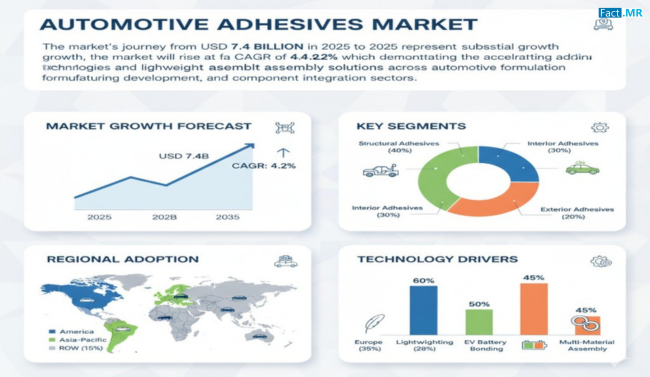Automotive adhesives have become a cornerstone in modern vehicle manufacturing, offering innovative solutions that improve structural integrity, aesthetics, and efficiency. With increasing demand for lightweight vehicles and the growing adoption of electric vehicles (EVs), adhesives are replacing traditional fastening methods like bolts, rivets, and welds. Their ability to reduce vehicle weight, enhance performance, and support sustainability makes them critical for the automotive industry.
Market Overview:
Automotive adhesives are specialized materials used in vehicle assembly, ranging from structural bonding to glazing, paint shops, and interior applications. Types of adhesives include structural adhesives, tapes and films, threadlocks, retainers, and liquid gaskets. These products play a crucial role in enhancing vehicle safety, reducing noise and vibration, improving aerodynamics, and boosting fuel efficiency. Additionally, adhesives contribute to luxurious and seamless vehicle interiors, aligning with evolving consumer preferences for comfort and design.
Key Trends & Developments:
Several trends are shaping the automotive adhesives market:
- Electric Vehicle Integration:Adhesives are increasingly used in EV battery assembly, helping reduce vehicle weight and comply with strict emission regulations.
- Lightweight Vehicle Focus:Reducing reliance on metal fasteners improves fuel efficiency and lowers overall emissions.
- Sustainability Initiatives:Water-borne adhesives and low-VOC formulations are gaining traction due to environmental regulations and consumer demand for eco-friendly products.
- Advanced Product Launches:Manufacturers are introducing adhesives with faster curing times, higher strength, and multifunctional applications to streamline production.
- Luxury Vehicle Demand:High net-worth consumers seeking premium interiors drive demand for upholstery glue, leather adhesives, and fabric glues.
Regional Insights:
- North America:The United States is a leading market, driven by strong automotive production, R&D investment in adhesive technologies, and adoption of eco-friendly materials. Initiatives like OEM application centers help in customizing adhesive solutions for various applications.
- Europe:European countries, including Germany, France, and the UK, are key markets due to the presence of prominent automotive manufacturers such as BMW, Audi, and Volkswagen. Increasing EV sales, stringent emission standards, and focus on high-quality vehicle interiors support adhesive demand.
- Asia-Pacific:Countries like China, India, Japan, and Korea are witnessing rapid growth in automotive production. Affordable labor, low raw material costs, and government initiatives promoting EVs create favorable conditions for automotive adhesive adoption.
- Other Regions:Latin America and the Middle East are gradually expanding markets with increasing interest in lightweight vehicles, industrial applications, and luxury vehicle segments.
Applications & End-Use Outlook:
Automotive adhesives serve multiple applications:
- Passenger Vehicles:The majority of demand comes from passenger vehicles, driven by rising disposable income and preference for premium interiors.
- Light and Heavy Commercial Vehicles:Adhesives enhance structural durability, reduce vibrations, and improve assembly efficiency in commercial vehicles.
- EVs and Battery Applications:Adhesives ensure battery safety, thermal management, and weight reduction in electric and hybrid vehicles.
- Interior Applications:Upholstery, leather, fabric, and trim adhesives are increasingly used to deliver comfortable and aesthetically appealing vehicle interiors.
- Industrial Applications:Adhesives are applied in paint shops, glazing, and engine components, improving vehicle durability and assembly speed.
Competitive Landscape:
The automotive adhesives market is competitive, with major players including Dow Inc., Henkel AG & Co. KGaA, Arkema S.A., Franklin International, Jowat SE, Ashland, Sika AG, DuPont, 3M, and Huntsman International. Companies are focusing on R&D, product innovation, and sustainability. Start-ups are entering the market with fast-curing, low-VOC, and environmentally friendly adhesive solutions for emerging automotive applications. Strategic partnerships with vehicle manufacturers and customization of adhesives for specific applications are key strategies for market success.
Challenges:
Despite growth opportunities, the market faces challenges such as raw material price volatility, regulatory compliance for toxic chemicals, and the need for sustainable formulations. Manufacturers must balance performance, cost, and environmental impact to remain competitive. Additionally, increased competition from new entrants requires continuous innovation and brand differentiation.
Conclusion:
The automotive adhesives market is set to play a pivotal role in shaping modern vehicle manufacturing. With applications spanning structural bonding, interiors, EV battery assembly, and industrial processes, adhesives improve safety, efficiency, and aesthetics. Sustainability trends, lightweight vehicle initiatives, and technological innovation are driving market expansion. Companies focusing on eco-friendly, high-performance, and fast-curing adhesives are poised to capture significant growth opportunities. As the automotive industry evolves, adhesives will continue to be a key enabler of innovation, comfort, and environmental compliance.
Browse Full Report – https://www.factmr.com/report/3800/automotive-adhesives-market



